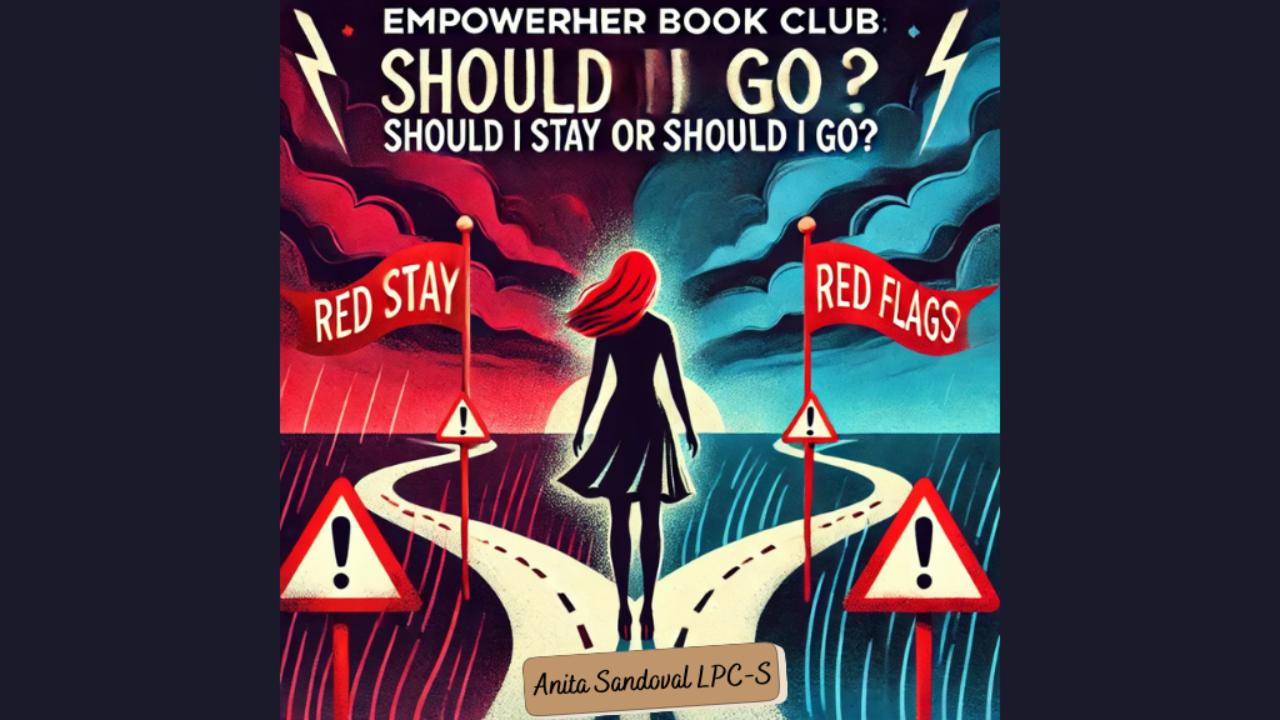EmpowerHer Book Club: Should I Stay or Should I Go? – Chapter 3, Part 2: Red Flags

EmpowerHer Book Club: Should I Stay or Should I Go? – Chapter 3, Part 2: Red Flags
Welcome back to the EmpowerHer Book Club! We’re diving into Part 2 of Chapter 3 from Dr. Ramani Durvasula’s eye-opening book, Should I Stay or Should I Go?: Surviving a Relationship with a Narcissist. This section focuses on critical red flags to watch for in relationships—key indicators that can help you recognize unhealthy patterns and make empowered decisions for your well-being.
If you're reading along or tuning into our accompanying audio podcast, I encourage you to take notes and reflect on how these red flags may have shown up in your own experiences. And if you haven’t already, be sure to join our free EmpowerHer Community, where we continue these powerful discussions in a supportive space.
Red Flags to Watch For
1. Greedy
Greed isn’t just about wanting more—it’s about a deep sense of entitlement. A narcissistic partner may show this through an obsession with material possessions, status, and money. Their self-worth is tied to what they own and how they compare to others, making relationships feel transactional rather than genuine.
🚩 Red Flag: Does he put others down for having more or less than he does? Greed can be an early indicator of deeper entitlement issues.
2. Emotionally Cold
Narcissists lack emotional depth. Their partners often describe them as distant, detached, or unable to truly connect. Unlike shyness, which is rooted in social discomfort, emotional coldness is a pattern of disinterest, especially when deeper emotions arise.
🚩 Red Flag: Does he consistently disengage when you express feelings or avoid emotional intimacy? Over time, this can leave you feeling lonely in the relationship.
3. Gaslighting
Gaslighting is a form of emotional abuse where a partner denies your reality, making you question your own experiences. Phrases like “That never happened,” “You’re too sensitive,” or “You’re overreacting” are common tactics used to distort your perception of reality and erode your confidence.
🚩 Red Flag: If you constantly second-guess yourself or feel like you’re losing your mind, take note—this is not love; it’s manipulation.
4. Cheap
While financial mindfulness is one thing, narcissists take cheapness to another level. They might remind you of every dollar they spend on you, use money as leverage, or avoid any generosity that doesn’t serve their own interests.
🚩 Red Flag: Does he make a big deal out of small acts of generosity? True giving doesn’t come with strings attached.
5. Never Takes Responsibility
Narcissists are masters at dodging blame. No matter the situation, they refuse to take ownership of their actions and will twist the narrative to make it seem like everything is someone else’s fault—often yours.
🚩 Red Flag: Pay attention to whether he ever apologizes sincerely or acknowledges mistakes. A person who never takes responsibility will never truly change.
6. Vain
Vanity goes beyond self-care—it’s an obsession with appearances. A narcissist may demand perfection not only in themselves but in their partner, house, and social image. This focus on external validation can make a relationship feel more like a performance than a partnership.
🚩 Red Flag: Does he expect you to maintain a certain look or criticize you if you don’t? Vanity often leads to objectification in relationships.
7. Controlling
Control in a narcissistic relationship often starts subtly. Over time, it can grow into isolation, decision-making power imbalances, and even emotional coercion.
🚩 Red Flag: If you feel like you need permission for basic choices or your partner’s sense of order overrides your needs, you might be dealing with a controlling dynamic.
8. Unpredictable
Walking on eggshells? Narcissists are known for their mood swings, often dictated by external validation. One moment they are affectionate and charming; the next, they are cold and dismissive.
🚩 Red Flag: If you never know what version of your partner you’ll get, it’s a sign of emotional instability that can be harmful over time.
Call to Action: Join the EmpowerHer Community!
Reading about these red flags is one thing—understanding them in the context of your own life is another. If any of these signs resonate with you, I invite you to join the EmpowerHer Community, a free online space where women support each other in navigating relationships, healing from emotional abuse, and stepping into empowerment.
🌟 Join us today and continue the conversation in a safe, supportive space! 🌟

